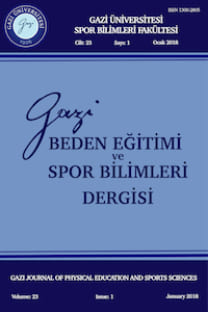İLKÖĞRETİM I. ve II. KADEMEDE BEDEN EĞİTİMİ DERSİNİN AMAÇLARINA GÖRE UYGULANMA DURUMUNUN İNCELENMESİ
Bu araştırmanın amacı, ilköğretim I. ve II. kademede beden eğitimi dersinin; daha etkin ve yaygın duruma getirilmesinde, gerek programın çocuk gelişimine etkisinin yeniden yapılandırılması çalışmalarına katkıda bulunabilmesi, gerekse dersin hedeflerine daha verimli ulaşabilmesi için beden eğitimi dersinin işlenişinde karşılaşılan problemleri ve öğretmenlerin sınıf öğretmeni veya beden eğitimi öğretmeni olmaları açısından beden eğitimi dersinin amaçlarına göre uygulanamama nedenleri incelenerek, sınıf öğretmenleri ile beden eğitimi öğretmenlerinin görüşleri arasındaki farklar çeşitli istatistiksel işlemler ile değerlendirilmiştir. Tarama modelindeki bu çalışmanın evrenini, Ankara ilinde faaliyet gösteren, ilköğretim okullarının I. ve II. kademesinde görev yapan 12.605 beden eğitimi ve sınıf öğretmeni, örneklemini ise evrenden tesadüfî olarak seçilen 1576 beden eğitimi ve sınıf öğretmeni oluşturmaktadır. Araştırma için gerekli olan verilerin toplanmasında araştırmanın amacına uygun olarak geliştirilen, kapsam ve görünüş geçerliliği için, alanın uzmanlarının görüş ve önerileri de dikkate alınarak hazırlanan bir anket kullanılmıştır. Elde edilen verilerin çözümlenmesinde, SPSS 11.0 (Statistical Package for Social Sciences) istatistik paket programından yararlanılmış, verilerin genel dağılım özelliklerini belirlemek için tanımlayıcı istatistik türlerinden frekans ve yüzde dağılımları kullanılmış, ölçeklerdeki ifadelere ilişkin görüşlerin ortalama değerleri ( ) verilmiş, ayrıca parametrik istatistik tekniklerinden t-testi ve faktör analizi kullanılmıştır. Verilerin istatistiksel analizi ve yorumlarda, p<0,05 anlamlılık düzeyi dikkate alınmıştır. Araştırma sonucunda ilköğretim I. ve II. kademede; beden eğitimi öğretmeni sayısının yetersiz olduğu, sınıf öğretmenlerinin lisans döneminden kaynaklanan eğitim formasyonu eksikliği nedeniyle kendilerini yeterli görmedikleri, dersleri yanlış ve eksik işledikleri, ayrıca çocukların ilköğretim birinci devreden ikinci devreye geçişte motor beceri ve yetenek gelişimlerinin istenilen düzeyde sağlanamadığı, beden eğitimi derslerinin amaçlarına ulaşılabilmesi için öğretmenlerin büyük bir çoğunluğu bu dersin branş öğretmenleri tarafından yürütülmesi gerektiği hususunda görüş belirtmişlerdir. Diğer taraftan beden eğitimi ders saatlerinin yetersiz olması, sınıfların kalabalık olması, beden eğitimi dersi ile ilgili bilimsel araştırmaların sonuçlarının ilköğretim okulları ve yetkililerce gözardı edilmesi ile okullardaki tesis, malzeme, araç-gereç eksikliği de beden eğitimi dersi öğretim programlarında amaçlanan hedeflere ulaşılmasını güçleştirmektedir.
Anahtar Kelimeler:
İlköğretim I. ve II. Kademe, Beden Eğitimi Dersi, Sınıf Öğretmeni, Beden Eğitimi Öğretmeni
STUDYING THE IMPLEMENTATION OF PHYSICAL EDUCATION CLASSES AT ELEMENTARY AND SECONDARY SCHOOLS ACCORDING TO ITS GOALS
The purpose of this study was to identify the reasons why physical education classes could not be implemented according to its goals with regard to teachers’ being, classroom teachers or physical education teachers, and to identify the problems during the physical education lessons in order to suggest better implementations and contribute to the reconstruction of the programme in regard to child development, and finally make it widely effective use of the physical education classes over elementary and secondary school programmes. The population of this survey type study was 12.605 physical education and classroom teachers who worked in elementary and secondary schools in Ankara. Randomly selected 1576 physical education and classroom teachers were the sampling of this research. By obtaining experts advice and recommandations for the content validity, a questionnaire was developed by the researcher. SPSS 11.00 (Statistical Package for Social Sciences) was used to analyse the data obtained. Statistically frequency, percentage values, mean ( ) for the average values were determined and t-test and factor analysis were used. In data analysis and results, p<0,05 was found as a meaningful level. The results of this study showed that the number of physical education teachers in both the elementary and secondary schools were not enough. Secondly, classroom teachers assessed themselves as inefficient for physical education classes because of their lack of experiences with the teaching in physical education in elementary school lessons during university years, and they noted that they had been insufficient and they had made mistakes while teaching physical education. Thirdly children’s motor skills and ability development could not reach the desired point when they passed through the secondary schools from the elementary. Then, most of the classroom teachers suggested that physical educators should teach the physical education classes in the elementary school in order to reach the goals of the programme. They also indicated that it was hard to reach the desired goals in physical education programme because the physical education hours in elementary schools were not enough, classes were overcrowded, the equipments were insufficient and the results of scientific studies about physical education are not taking into consideration by both elementary and secondary schools and responsible individuals in education.
Keywords:
Elementary and Secondary School, Physical Education Lesson, Classroom Teacher, Physical Education Teacher,
___
- AARNIO, M. (2003). Leisure-Time Physical Activity in Late Adolescence, A Cohort Study of Stability, Correlates and Familial Aggregation in Twin Boys and Girls, Journal of Sports Science and Medicine, 2(2): 1-41.
- BALL, E.J., O’CONNOR, J., ABBOTT, R., STEINBECK, K.S., DAVIES, P.S.W., WISHART, C., GASKIN, K.J., and BAUR, L.A. (2001). Total Energy Expenditure, Body Fatness and Physical Activity in Children Aged 6-9 Years, American Jour. of Clin. Nutr., LXXIV: 524-528.
- CHEN, A., ENNIS, D.C. (2004). Goals, Interests and Learning in Physical Education, The Journal of Educational Research, July/August, Univ. of Maryland College Park, XCVII (6): 329-338.
- COE, D.P. (2003). The Importance of Physical Education Closses in Relotion to Physical Activity Behaviors, Physical Fitness and Acedemic Achievement in Middle Scholl Children, The Degree of Doctor of Philosophy, Michigan State University, (Proquest Online Veri Tabanı, UMI No: 3115952, 14/05/2005).
- ÇÖKER, H.N. (1991). Ankara İlkokullarında Beden Eğitimi Derslerinin Etkinliğinin Değerlendirilmesi, Doktora Tezi, Hacettepe Üniversitesi, Sosyal Bilimler Enstitüsü, Eğitim Bilimleri Anabilim Dalı, Ankara.
- ISSN: 1300-2805
- Yayın Aralığı: Yılda 4 Sayı
- Başlangıç: 1996
- Yayıncı: Gazi Üniversitesi
Sayıdaki Diğer Makaleler
ÇOK BOYUTLU SPORTMENLİK YÖNELİMİ ÖLÇEĞİ’NİN TÜRKÇE UYARLAMASI: GEÇERLİK VE GÜVENİRLİK ÇALIŞMASI
BEDEN EĞİTİMİ ÖĞRETMENLERİNİN SINIF YÖNETİMİ DAVRANIŞLARI
İLKÖĞRETİM I. ve II. KADEMEDE BEDEN EĞİTİMİ DERSİNİN AMAÇLARINA GÖRE UYGULANMA DURUMUNUN İNCELENMESİ
İŞGÖREN ÖRGÜTSEL BAĞLILIK ÖLÇEĞİNİN TAKIM SPORCULARINA UYARLANMASI
Hanifi ÜZÜM, Nevzat MİRZEOĞLU, Ercan POLAT, Ayşegül AYATA
MÜSABAKA ÖNCESİ YAPILAN MASAJIN FUTBOLCULARIN DURUMLUK KAYGI DÜZEYLERİNE ETKİSİ
